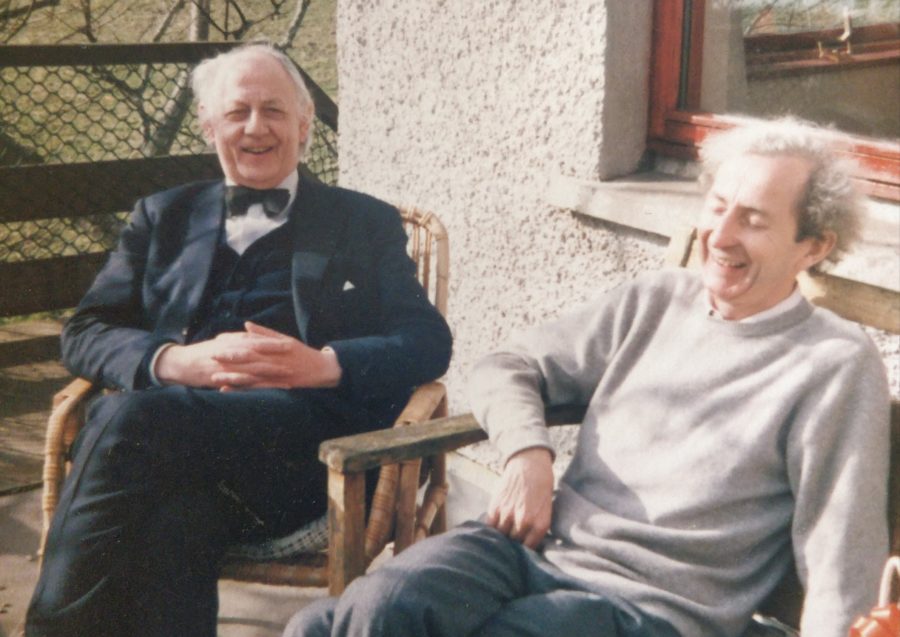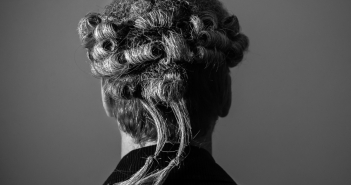A poor relation is the most irrelevant thing in nature, a piece of impertinent correspondence, an odious approximation, a haunting conscience, a preposterous shadow, lengthening in the noon-tide of our prosperity. He is known by his knock.
Charles Lamb
In 1954, when I was aged nine, my youthful uncle, aged twenty-five, returned to Ireland from what was then East Pakistan, now Bangladesh. To a child growing up near Sligo town this was a dramatic arrival. The KLM baggage labels read, ‘B K Fitzsimons, passenger from Dacca to Dublin.’
A retired British army major had fixed Bryan up with a three-year position as personal assistant to the managing director of an English company in the jute trade. Born in Liverpool, of Irish immigrant parents, his father had died young and his mother had returned to her native Sligo during World War II. A period of schooling as a boarder at St. Nathy’s College in Ballaghadereen had not yielded pointers to a suitable career for a student who had not shone academically, but had shown a keen interest in the good things in life, especially the company of friends.
The regimen at St Nathy’s had not suited Bryan’s tastes or his appetite, requiring his doting mother to send weekly food parcels to supplement the standard fare. Eventually this drew a postal edict from the headmaster banning the practice. Whereupon Bryan wrote to his mother, ‘if you don’t send me food you can send John Gallagher.’ The latter person was Sligo’s foremost undertaker.
My mother, I believe, had hoped that Bryan’s overseas posting might place a family embarrassment at a safe and permanent remove. The daughter of an impoverished widow, she had made what was seen as a socially significant marriage to a successful solicitor in the town. But BKF was back.
Bryan lived with our family, off and on, for years. I had two fathers. He took an interest in my education and brought me on many expeditions in my father’s car. Schooling me in the manners of the remnants of the British Raj, he paid particular attention to elocution. He openly announced the hope his protégé would manifest ‘the brains of his father, and the personality of his uncle.’ A caution occasionally uttered, courtesy of Oscar Wilde, was the possibility of the reverse occurring.
At various points in the 1950s, Bryan went on the high seas. His superior social skills and affinity for the good life helped him find a position with P&O Liners, serving as a waiter in the first class dining compartment. He seems to have been popular with crew at all levels, including the captain and upper echelon. In the course of duties, however, subservience did not come easily to him. Passengers whose dismissive demeanour implied he belonged to the lower orders met with brusque treatment. A drawling American woman who put the question, ‘What’s black pudding waiter?’, received a curt reply not designed to enhance her appetite: ‘pigs intestines madame.’ Other diners deemed ‘trouble’ by virtue of excessive demands could be pitilessly dealt with. One such had a dollop of Silver Dip added to her soup, confining her to cabin for several days, or at least that is how he recalled the episode to his amused nephews and nieces.
Bryan returned to Sligo after such voyages with a little money in his pocket, which was quickly dispensed in socialising. Staff at the Great Southern Hotel would not have guessed this high society figure in their dining room, entertaining in grand style, was one of their own. Always at ease in company, he was, indeed, the life and soul of any party, and a considerable raconteur. His signature apparel was definitely ‘Çountry’: extrovert plaid sports jacket and cavalry twill trousers.
After the seafaring interlude my father found clerical work for Bryan at his solicitors’ firm, dealing with insurance claims and the like. His disposition towards hilarity contrasted with the rather sombre atmosphere that had previously prevailed, and an easy telephone manner was increasingly called upon; he would develop a taste for the bustle and excitement around sittings of the District and Circuit courts.
Along the way he decided to read for the Bar. Undeterred by a lack of savings – it was always his practice immediately to spend any money that came his way – he talked the manager of the Provincial Bank into granting him a substantial loan. I assume my father augmented that regularly over the years that followed – and there were many of those years. Bryan found it difficult to settle into a life of study, and several exams had to be repeated. Yet he had also managed to woo a doctor’s daughter – one of the most admired young women in the town – and needed to do justice to that relationship.
After five years at boarding school myself, I caught up with Bryan in the realms of third level education in Dublin. It felt a little odd to have an uncle as a fellow law student. However, he entertained my friends enormously, always the last to leave a party and a dogmatic adherent of the ‘rounds’ system of ordering drinks.
I even shared a flat with him at one point, which became rather a drain on my own modest student allowance. One weekend, when I too was broke, he raided the landlady’s telephone call-box, which delivered a cascade of noisy copper pennies that he transported to a pub in Ranelagh, laying fistfuls on the counter in exchange for his nightly quota of Smithwicks. In due course, I began to see a situation where I might complete my legal education leaving my familial senior behind. I therefore put the skids under him to get him to apply himself to his final exam for the Bar. My sister and I reined him in, virtually standing guard over him by night, with no drink allowed unless several hours of study had been completed.
On the day of the exam I arrived early in the morning at his digs. To my relief he was awake and looking chipper. After a hearty breakfast I escorted him out the door whereupon we met glorious morning sunshine. He paused. I said, ‘let’s get going Bryan.’ To which he responded by throwing back his head and laughing, before sauntering down the street, in the wrong direction.
But ‘the uncle’ was not without resources. During a later attempt at his finals, he deployed the full possibilities of emerging short-wave technology. ‘I’m wired for sound’, he confided in the run-up to his repeats, opening his coat to reveal an array of the latest electronic equipment. These would enable him to communicate with a loyal friend on the outside, who could supply answers to the questions submitted sotto voce in the cavernous dining hall of the King’s Inns.
Indeed, he had been previously implicated in a plot designed to get an entire class of his aspiring barrister friends through oral tests for the ‘Junior Victoria Examination.’ These were administered by the fearsome Professor Fanny Moran, who charged her students with being, ‘ferociously accurate and ruthlessly precise.’ For her oral exam, students were herded into a room from which there was no means of exit, save through another room where the redoubtable Fanny lay in wait as examiner. Only after the interview were they released, one by one.
In the interests of fairness, each student was asked the same question, which was the reason for the incarceration. Bryan, however, had by this time formed a friendship with a wireless engineer, who lent him the latest in walkie talkie sets. The scheme ensured a level playing field for all candidates, except for the first to be examined. There had to be one martyr, who was tasked with carrying news of the question to a car waiting outside the King’s Inns, from whence the message would be radioed back to the rest of the students, who could consult their textbooks for the correct answer.
Unfortunately the first candidate misunderstood the question, which was, nonetheless, dutifully relayed to those remaining in the room. By the fourth interview Fanny Moran burst forth: ‘I don’t know why it is, but all of you seem to give the same wrong answer.’ When this frightful intelligence reached the control vehicle feverish attempts were made to regain radio contact with the rest of the candidates, who had by this stage switched the equipment off. In the course of the failed operation a barrister-tutor, later a judge of the Superior Courts, chanced to pass down Henrietta Street. Glancing at the car and its occupants, he immediately surmised the situation. ‘Lads’, he said, ‘ye have gone a long way since we used to slip five shillings to the porter to get hold of the question.’
By fair means or foul, Bryan did receive a call to the Bar. Money, however had run out and there were debts undischarged. He went to London from time to time to replenish his coffers, returning at intervals. In the course of a visit home, my father having passed away, Bryan was called upon to give away my eldest sister. By this stage he was drinking heavily. The family exerted all manner of pressure to ensure he would be ‘in form’ to discharge this role with style and dignity.
In spite of solemn undertakings, Bryan visited Sligo town on the morning of the wedding and returned the worse for wear. Shortly before the bridal car departed for the church he was seen grasping, not a glass of gin and tonic, but a jug. As bride and uncle linked arms in the traditional passage up the aisle one onlooker was heard to say it was unclear who was supporting who.
In the late 1970s Bryan again took the boat to England, and effectively disappeared for some years. The family attempted to trace him, but without success. By this time I was established in corporate law practice and had occasion to visit London on business. On receiving a tip-off of an address where he might be located I managed to make contact, and arranged to meet him at my hotel.
After consuming as many drinks as were compatible with my work assignments for the following day, I invited Bryan to share my twin-bedded room at the hotel. I had learned that he was living in cheap accommodation and had taken up casual employment as a waiter for banquets and the like. The suit and shoes he wore were the only outer garments in his possession. The following morning he asked if I would meet him again that evening, saying, ‘there’s a friend of mine I’d like you to meet.’
Joining up, we set off towards a smart address in Chelsea, arriving at one of those elegant bijou dwellings where curtains are left undrawn, allowing passers-by to peer enviously into elegantly furnished rooms. A tall, handsome woman opened the door, and I was introduced to ‘Jane’ as ‘a friend from Ireland’; I was just glad to be wearing my business suit in this rarefied environment. Chit-chatting over a glass of Sherry in the drawing room, Bryan mentioned a connection with the politician Garrett FitzGerald, who was known to the lady. He then asked her in jest, ‘where are you taking me now?’ Jane expressed a desire to go out for dinner, so we made our way to ‘The Gay Hussar’ restaurant in Soho.
Settled at a comfortable table, the ordering complete, Bryan looked at our guest (mine really – it was obvious who was going to foot the bill), and in a most sympathetic tone said, ‘my dear, you look tired.’ ‘Well I am’, she replied, ‘I have been in the house all day.’ I had a momentary vision of her bent for hours over domestic tasks. Then it twigged, as I recalled an invitation card addressed to one ‘Jane Ewart-Biggs’ lying on her mantelpiece. ‘The House’’ I realized, was the House of Lords, and this was the wife of the former British Ambassador, Christopher Ewart-Biggs, assassinated by the IRA in Dublin in 1976.
Bryan confided to me afterwards that he had written a letter to the grieving widow to express his abject shame at what his countrymen had done. He further added that that if she was ever in need of company of an evening he would be glad to give what comfort he could offer, to which she had responded.
Having been run to ground in this way, the family resolved to repatriate him and provide some level of support. A little house was purchased on the edge of Sligo town. My then circumstances enabled me to pay him a modest stipend to provide for his basic needs. Banking systems had advanced sufficiently to allow an account to be programmed so that a maximum amount could be withdrawn every week, thereby avoiding splurges when the monthly transfer arrived in the account.
From this base Bryan attempted to develop a legal practice. A number of solicitors in the town were willing to pass undemanding District or Circuit Court cases his way, and he was said to be impressive on his feet. Where a case demanded a greater level of legal knowledge, he would post the papers to me in Dublin and I would endeavour, with the help of my office library, to ghost the sort of reply that I hoped would meet the satisfaction of his clients. Bryan ‘got by’ for a number of years pursuant to these arrangements. He also struck up a relationship with a good and loving woman, whom he had known in his youth.
During this period, while visiting a renowned tailor from Sligo, Martin & Son, with a base on Fitzwilliam Square in Dublin, I asked whether it ever happened that a client, for example one from the U.S. – this tailor visited California regularly to take orders – failed, for whatever reason, to take delivery of a suit. I was thinking of Bryan, I explained, who was well known to the Sligo native. ‘Leave it to me’, he said.
I heard nothing more until another family wedding came around. This time the family were taking no chances. I was to give away the bride. Bryan was, in fact, well behaved on the day. He took his place in a pew looking the proverbial million dollars in an impeccable dark suit and pink tie. I caught up with him in the bustle of the reception at the family home, and asked how he had come by such a fine suit. ‘The suit?’, he responded, ‘I thought you knew all about that!’ ‘Tell me more’, I said.
‘Well’, he answered, ‘I was walking down Wine Street and a head peeped out from the tailoring emporium. ‘Bryan’, a welcoming voice said, ‘there’s to be a suit for you.’ I thought to myself – this is the chance of a lifetime. I asked them to bring out the finest quality English and Italian materials available in the shop, but I didn’t like any of them so I asked for the sample books and chose another to be ordered in.’
As I listened, my jovial mood ebbed away somewhat. Some weeks later, I called into the tailor, and it became obvious a serious breakdown in communication had occurred. We agreed a settlement satisfactory to neither of us.
A short time after these events, Bryan, perhaps under the influence of his good woman friend, abstained from alcohol throughout the Lenten period. We had high hopes. But Easter Sunday arrived with a vengeance. After a course of pre-prandials at Austie Gillen’s pub in Rosses Point he weaved an unsteady course down the driveway to the family home. As he approached, my mother was heard to rasp, ‘here comes trouble.’ Some days later Bryan breathed his last. It was speculated that the transition from Lenten abstinence to Easter inebriation was more than his system could tolerate.
I was in Dublin and dissolved on hearing the news. As the arrangements for the funeral proceeded, I received a call from my solicitor brother. He said the tradition had been for burial in a funerary habit, but that this was beginning to change in favour of contemporary dress. ‘He does have a fine suit’, he said, ‘but it’s barely worn.’ ‘Bury him in the suit’, I gasped.
Footage (at about 4:40) of Bryan in that suit, with gin and tonic in hand, can be seen in this family movie shot by my fourteen-year-old nephew Ed Rice.




